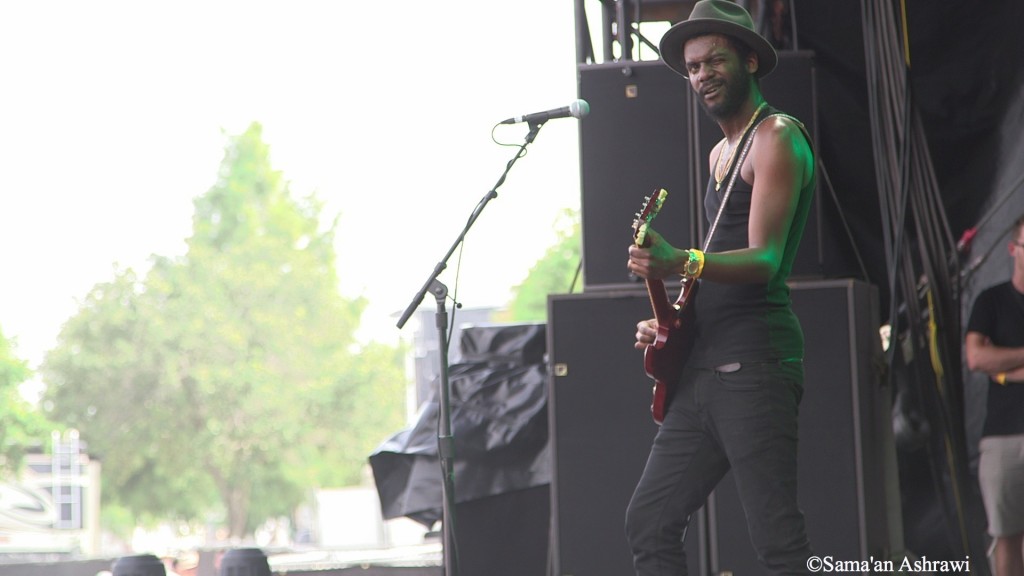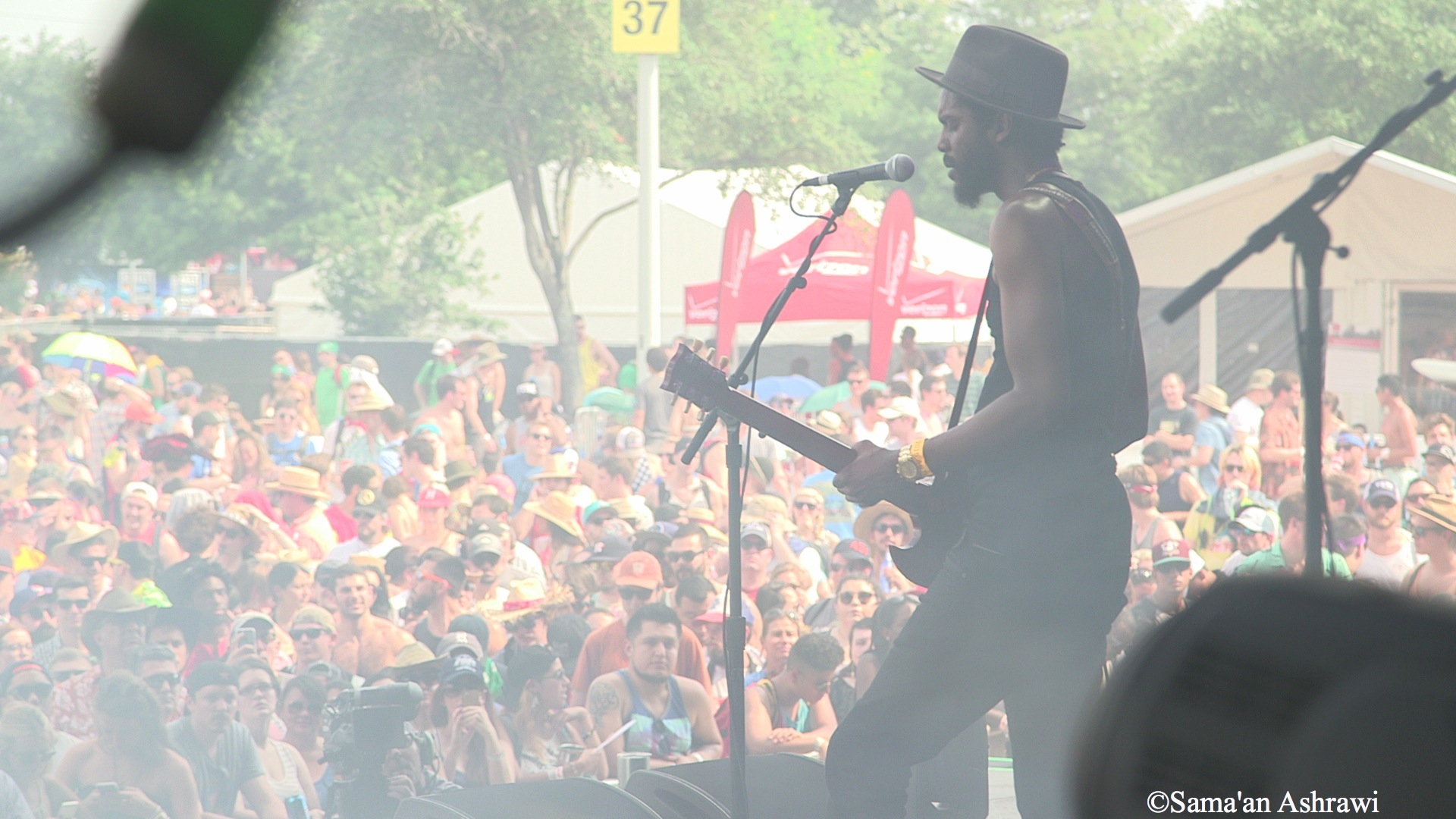
If you happen to be strolling through downtown Austin on the right night, walk into a bar like The Mohawk and look around closely. Standing in the shadows, you might just see the smiling face of the first person in the history of the GRAMMYs to ever be nominated for Best Rock Song and Best Traditional R&B Performance in the same year, 29-year-old Gary Clark Jr., brew in hand, absorbing the night’s musical offerings.
Were there ever a 20-something (edit: now 30 y.o.) who fit the description of “old soul,” it’s Gary. He’s shared the stage with legends like B.B. King, Eric Clapton, Buddy Guy, Booker T, and the Rolling Stones (to name a few), but he prefers to make music with Childish Gambino, Tech N9ne, and Talib Kweli. Now, Gary finds himself up against Paul McCartney, Black Sabbath, and, yes, the Stones, at this Sunday’s (edit: 2014) GRAMMYs—and that’s just in one category.
Usually reserved and pensive, today Gary is geeked at the thought of being listed alongside names of that caliber. Gary is at the airport waiting on his flight to Los Angeles for this weekend’s festivities, and we didn’t want him to get bored, so we called him to talk about his historic Grammy nominations (both from his major label debut album, Blak and Blu), the source of his versatility, and the spirituality of guitar solos.
Sama’an: Where are you right at this exact moment?
Gary Clark Jr.: Newark Airport, heading to L.A. I take off in, like, an hour.
S: Do you have a preference when it comes to New York-area airports?
G: Nah, I hate all airports. [laughs]
S: What do you see around you?
G: Ronald McDonald across the hallway, Super Bowl merch; I’m watching Bryant Gumbel Real Sports, talking about medical marijuana and its effects on athletes.
S: Any crazy characters at your gate?
G: It’s pretty tame today; there’s an older guy chewing his gum like it’s runnin’ out of style, another guy lookin’ at the TV like he wants to stab it, that’s about it.
S: Let’s get right into things: You’re the first artist in Grammy history to be nominated for Best Rock Song and Best Traditional R&B Performance in the same year, which has to feel somewhat validating for an artist as versatile as you.
G: Yeah, man. Well, I’ve had somebody call me “musically schizophrenic.” I’ve heard a bunch of people say, “Stick to the Blues,” or “You should [just] do rock,” and, you know, people say, “You gotta pick one thing.” People can’t grasp you being all over the place. I understand that and I respect that opinion, but, it’s music and there are no rules to it—so why should I make up rules for myself? To get nominated in two different genres in the same year, it’s like, “Well? See!” [laughs] In the nicest way possible. There’s something to be said for going with your gut.
S: Where does your versatility as a musician come from? Can you pinpoint a specific source where all that versatility came from?
G: Versatility? Man, I can tell you right now: 6th Street, Austin, Texas. Just wandering around the downtown area, you know what it is: reggae in one door, the next door you hear funk, the next door you hear jazz, the next door is blues. I was curious when I was younger, so, I just wandered into all those places and soaked it all up. I grew up in a diverse community as well [where] people were listening to all kinds of music and I didn’t think much about it. If I liked it, I just liked it—I didn’t put a label on it. I didn’t close myself off of listening to certain things just because of what it was called.
S: In the Best Rock Song category, you’re up against some pretty big names…
G: [laughs] Yeah, man. [laughs] I don’t even know. It’s just crazy looking at it. It’s like all these guys—and then it’s, like, me! Like, “Really? Alriiiight.” It’s crazy, man. We’re talking about legendary musicians. I never would’ve thought… It’s kind of surreal, but not a bad place to be.
S: When it comes to awards, are the GRAMMYs something you really want? A sort of stamp of approval you need? Or is it more like, “If I win, I win. If not, keep on truckin’.”
G: I’m not gonna lie, it would be nice to see one of those things up close and hold it. [And have] somebody tell me it’s mine. But I’m already winning just by being invited to the GRAMMYs. Just being there is cool enough for me, but I’m not gonna lie to you and say I don’t care. I grew up watching the GRAMMYs [and] I made it this far, it’d be nice to scoop one up.
S: There’s a brilliant moment midway through “If You Love Me Like You Say” where you transform your guitar into a turntable, so to speak. The only other time I’ve heard someone pull that off was Tom Morello on [Rage Against the Machine’s] “Bulls on Parade.” Is there a word for that technique?
G: Umm, I don’t know. I just kind of refer to it as “scratching.” If there’s another musical term for that, I’m not familiar.
S: When you recorded that track, was it a spontaneous decision to start scratching on your guitar?
G: It’s something I’ve been doing for a while. I remember I was playing years ago and it just kind of happened. I was just playing along to this groove. They call it a “rake” when you take the [guitar] pick and you just strum it one time all the way down the string. [I did that and] I just started going back and forth with it. I wasn’t consciously trying to do it.
So on that particular part of [“If You Love Me Like You Say’], the scratching developed from jamming—kinda running out of notes to play. It was spontaneous and it just stuck. Like, “What was that? I liked that.” So I left it in. One of those things that just happened.
S: That scratch solo is cool because it comes sandwiched between a Jimi Hendrix cover (“Third Stone From the Sun”) and an Albert Collins cover (“If You Love Me Like You Say”), which says a lot about you as a musician. You have so many different sensibilities that you bring into the recording studio. Tell me about the direct and/or indirect influence Hip-Hop has on your music.
G: Hip-Hop is a major influence. In my house in Austin, I had a room with drums, guitars, keyboards, horns, and other live instruments, and then in the other room it was turntables, a beat machine, a synthesizer, and all my [vinyl] records. Like “Bright Lights,” the original demo is like a beat machine, synth, keys, and I played a little live bass and live guitar on there. A lot of times when I start to make a song, the process starts off with a beat machine. And on “Blak and Blu” I used a sample. I put samples in over the beat and I was just playing along with it. I eventually took out the sample and decided to just play the instruments myself.
So, yeah, Hip-Hop has a major influence on me and how I write songs. I like that process.
S: I think it’s safe to say that all the guitar gods have their own distinct “solo face.” Whose is your favorite? Describe it, if you can.
G: [laughs] Oh man [laughs] Now I’m going through all the guitar players I listen to and I’m just thinking of them making these weird faces and I’m trying to pick my favorite! [laughs] I think the coolest would have to be Jimmy Vaughn [older brother of Texas blues guitar legend, Stevie Ray Vaughan]. It’s hard to explain [that face]. It’s like, “I got this, and I’m killin’ y’all right now, but I’m cool about it.” When you make those faces, that’s when you’re fully letting go and letting the music take over; it’s not about you any more.
(above: Sama’an’s interview with Gary for Okayplayer)
